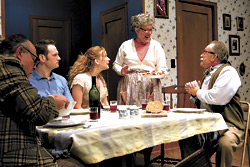 Over the River and Through the Woods
Over the River and Through the Woods
Taproot Theater, 204 N. 85th St., 781-9707, www.taproottheatre.org. $10–$33. 7:30 p.m. Wed.–Thurs., 8 p.m. Fri.–Sat., 2 p.m. Sat. Ends June 14.
The Italian grandmother who force-feeds everyone in sight a 15-pound lasagna should have grown tiresome by now—especially when combined with a number of other old-fogy stereotypes, including a fear of technology and a lack of appreciation for all things worldly. Yet the four grandparents of Over the River and Through the Woods are utterly hilarious as they attempt to guide their grandson away from the promotion that would take him from New York to Seattle. They conspire to set him up with a girl, a perfectly attractive, intelligent girl, who has no aspirations to leave the city. As Nick, the devoted grandson, Kevin Brady plays a wonderfully agitated straight man to his four over-the-top grandparents (Gretchen Douma, Bill Johns, Kim Morris, and Nolan Palmer). If they occasionally run over the laugh lines, they can be forgiven for their otherwise excellent timing. Joe DiPietro’s play is mercifully unpredictable, and instead of a kooky romantic comedy, we get a complex story of the “family versus career” question that’s been plaguing the past generation or two. Without revealing the ending, I’ll congratulate DiPietro for refusing to choose a side; we’re left happy and sad, and that’s exactly what we’re supposed to feel. BRENT ARONOWITZ
 The Ten Thousand Things
The Ten Thousand Things
Washington Ensemble Theatre, 608 19th Ave. E., 800-838-3006, www.washingtonensemble.org. $10–$18. 8 p.m. Thurs.–Mon. Ends June 16.
There is an important piece of business to be taken care of prior to the start of The Ten Thousand Things. It’s the kind of business that makes most people slump in their chair and attempt to hide behind the person in front of them. At least that’s what everyone did when one of the actors asked for a volunteer. One brave soul finally raised his hand, and was asked to pull a scrap of paper from a bag. The scrap revealed a word, which the volunteer was cryptically asked to change to anything he wanted. After a few careful moments of deliberation, the man came up with an interesting word, and that’s how the script of The Ten Thousand Things is changed every single time it’s performed.
Written by Paul Mullen, the play was inspired by the 10,000 Year Clock Project (Long Now Foundation), whereby a proposed clock ticks once every year. Mullen’s play “ticks” every time it’s staged; eventually, one word of dialogue at a time, it’ll be altered into something else entirely. The play interweaves the contemporary story of a frustrated writer and a mythic tale of creation, all the while revolving around the concept of time. Time is the “mystery that will always elude us.” It is nearly impossible to define without slipping into a redundancy. Yet we are constantly referencing it, always musing about the past and the future and our place in between. The Ten Thousand Things challenges notions of faith and humanity by asking if what we do matters beyond us. As the show comes to its remarkable end, the answer appears to be a resounding yes. NANCY SMITH
Until the Last Dog Dies
Capitol Hill Arts Center, 1621 12th Ave. Ran Thurs., May 29–Sun., June 1.
In Until The Last Dog Dies, Deborah Senn takes her audience to a place at once awkwardly personal, deeply boring, and frequently, if unintentionally, hysterical. Senn’s play is based on her failed bid for State Attorney General in 2004 and her battle with a multimillion-dollar smear campaign, secretly financed by the U.S. Chamber of Commerce. Predictably, she has emerged jaded from this experience, and, despite what should be intriguing subject matter, this is not good theater. As there is only one character—she plays herself—and as she usually speaks directly to the audience, the “play” is more like bad stand-up, periodically interrupted by private phone conversations and bisected with an intermission. The first act primarily deals with Senn’s triumphs over Big Insurance when she held the office of State Insurance Commissioner. To close a lecture on her dutiful work in that capacity for Washington’s senior citizens, in a moment when older patrons are leaning forward in rapt attention, Senn dissolves into a manic display of cursing and running frenzied about the stage. At one point, joking about unfortunate things often happening to her in the morning, Senn reflects on how, unable to sleep on September 11, 2001, she turned on her television just in time to see the second plane hit the World Trade Center. And she thinks bad things happen to her in the morning? Until The Last Dog Dies is at once a platform from which to take potshots at independently wealthy politicians and a show absolutely and tastelessly obsessed with money. Hilariously strange. VIRGINIA ZECH




